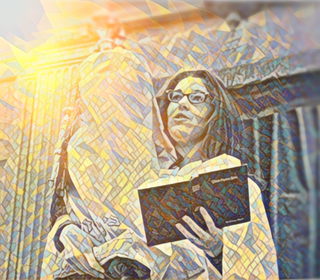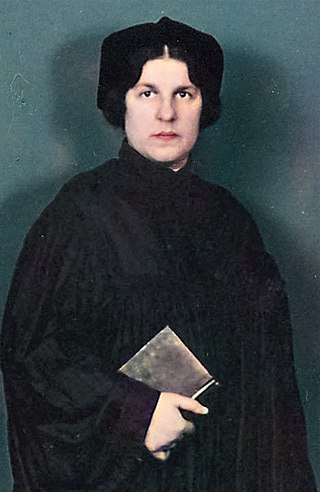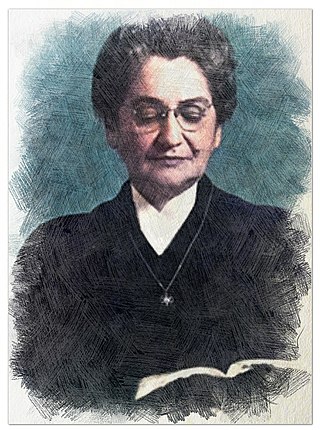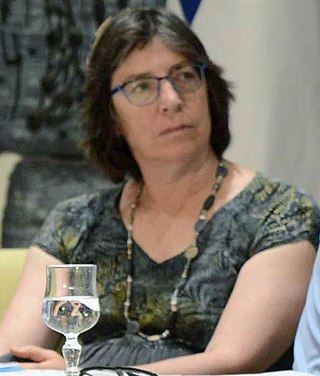Related Research Articles

Conservative Judaism is a Jewish religious movement that regards the authority of Jewish law and tradition as emanating primarily from the assent of the people through the generations, more than from divine revelation. It therefore views Jewish law, or halakha, as both binding and subject to historical development. The conservative rabbinate employs modern historical-critical research, rather than only traditional methods and sources, and lends great weight to its constituency, when determining its stance on matters of practice. The movement considers its approach as the authentic and most appropriate continuation of halakhic discourse, maintaining both fealty to received forms and flexibility in their interpretation. It also eschews strict theological definitions, lacking a consensus in matters of faith and allowing great pluralism.
The Rabbinical Assembly (RA) is the international association of Conservative rabbis. The RA was founded in 1901 to shape the ideology, programs, and practices of the Conservative movement. It publishes prayerbooks and books of Jewish interest, and oversees the work of the Committee on Jewish Law and Standards for the Conservative movement. It organizes conferences and coordinates the Joint Placement Commission of the Conservative movement. Members of the RA serve as rabbis, educators, community workers and military and hospital chaplains around the world.

The role of women in Judaism is determined by the Hebrew Bible, the Oral Law, by custom, and by cultural factors. Although the Hebrew Bible and rabbinic literature mention various female role models, religious law treats women differently in various circumstances. According to a 2017 study by the Pew Research Center, women are slightly more likely to identify with Judaism. They account for 52% of the worldwide Jewish population.
A rabbi is a spiritual leader or religious teacher in Judaism. One becomes a rabbi by being ordained by another rabbi—known as semikha—following a course of study of Jewish history and texts such as the Talmud. The basic form of the rabbi developed in the Pharisaic and Talmudic eras, when learned teachers assembled to codify Judaism's written and oral laws. The title "rabbi" was first used in the first century CE. In more recent centuries, the duties of a rabbi became increasingly influenced by the duties of the Protestant Christian minister, hence the title "pulpit rabbis", and in 19th-century Germany and the United States rabbinic activities including sermons, pastoral counseling, and representing the community to the outside, all increased in importance.

The Jewish Theological Seminary (JTS) is a Conservative Jewish education organization in New York City, New York. It is one of the academic and spiritual centers of Conservative Judaism and a center for academic scholarship in Jewish studies. The Jewish Theological Seminary Library is one of the most significant collections of Judaica in the world.
Joel Roth is a prominent American rabbi in the Rabbinical Assembly, which is the rabbinical body of Conservative Judaism. He is a former member and chair of the assembly's Committee on Jewish Law and Standards (CJLS) which deals with questions of Jewish law and tradition, and serves as the Louis Finkelstein Professor of Talmud and Jewish Law at the Jewish Theological Seminary of America in New York City, where he formerly served as dean of the Rabbinical School. He is also Rosh Yeshiva of the Conservative Yeshiva in Jerusalem, Israel, an institution founded and maintained by the United Synagogue for Conservative Judaism and under the academic auspices of JTS. In 2006, Rabbi Roth took over as chair of the Hebrew Language department at JTS. Rabbi Roth is a well-known teacher of Hebrew grammar. He is a vociferous proponent of the existence of the "sheva merakhef".

The Hebrew Union College – Jewish Institute of Religion is a Jewish seminary with three locations in the United States and one location in Jerusalem. It is the oldest extant Jewish seminary in the Americas and the main seminary for training rabbis, cantors, educators and communal workers in Reform Judaism. HUC-JIR has campuses in Cincinnati, Ohio, New York City, Los Angeles, and Jerusalem. The Jerusalem campus is the only seminary in Israel for training Reform Jewish clergy.

Sally Jane Priesand is America's first female rabbi ordained by a rabbinical seminary, and the second formally ordained female rabbi in Jewish history, after Regina Jonas. Priesand was ordained by the Hebrew Union College-Jewish Institute of Religion on June 3, 1972, at the Plum Street Temple in Cincinnati. After her ordination she served first as assistant and then as associate rabbi at Stephen Wise Free Synagogue in New York City, and later led Monmouth Reform Temple in Tinton Falls, New Jersey from 1981 until her retirement in 2006. She is featured in numerous books including Rabbis: The Many Faces of Judaism and Fifty Jewish Women who Changed the World.

Regina Jonas was a Berlin-born Reform rabbi. In 1935, she became the first woman to be ordained as a rabbi. Jonas was murdered in the Holocaust.

Paula Ackerman was thought to be the first woman to perform rabbinical functions in the United States, leading the Beth Israel congregation in Meridian, Mississippi from 1951 to 1953 and the Beth-El congregation in Pensacola, Florida briefly in the 1960s. She led the National Committee on Religious Schools for the National Federation of Temple Sisterhoods.
Jewish feminism is a movement that seeks to make the religious, legal, and social status of Jewish women equal to that of Jewish men in Judaism. Feminist movements, with varying approaches and successes, have opened up within all major branches of the Jewish religion.
Open Orthodox Judaism is a Jewish religious movement with increased emphasis on intellectual openness and a more expansive role for women. The term was coined in 1997 by Avi Weiss, who views halakha as permitting more flexibility than the normal practices of Orthodox Judaism.

Women rabbis are individual Jewish women who have studied Jewish Law and received rabbinical ordination. Women rabbis are prominent in Progressive Jewish denominations, however, the subject of women rabbis in Orthodox Judaism is more complex. Although Orthodox women have been ordained as rabbis, many major Orthodox Jewish communities and institutions do not accept the change. In an alternative approach, other Orthodox Jewish institutions train women as Torah scholars for various Jewish religious leadership roles. These roles typically involve training women as religious authorities in Jewish Law but without formal rabbinic ordination, instead, alternate titles are used. Yet, despite this alteration in title, these women are often perceived as equivalent to ordained rabbis. Since the 1970s, over 1,200 Jewish women have been ordained as rabbis.
The first openly lesbian, gay, bisexual, and transgender clergy in Judaism were ordained as rabbis and/or cantors in the second half of the 20th century.
Alfred Gottschalk was a German-born American rabbi who was a leader in the Reform Judaism movement, serving as head of the movement's Hebrew Union College-Jewish Institute of Religion (HUC) for 30 years, as president from 1971 to 1996, and then as chancellor until 2000. In that role, Rabbi Gottschalk oversaw the ordination of the first women to be ordained as rabbis in the United States and Israel, and he oversaw the development of new HUC campuses in Jerusalem, Los Angeles and New York City, three of the school's four campuses.

Naamah Kelman-Ezrachi is an American-born Reform rabbi who was named as Dean of the Hebrew Union College-Jewish Institute of Religion campus in Jerusalem starting in July 2009. In 1992, Kelman made history as the first woman in Israel to become a rabbi when she received her rabbinic ordination from Rabbi Alfred Gottschalk.
Sandy Eisenberg Sasso is the first woman to have been ordained a rabbi in Reconstructionist Judaism. She was ordained by the Reconstructionist Rabbinical College in Philadelphia, on May 19, 1974. She is also the author of many children's books on religious topics.

Sara Hurwitz is an Orthodox Jewish spiritual leader aligned with the "Open Orthodox" faction of Modern Orthodox Judaism in the United States. She is considered by some to be the first female Orthodox rabbi. She serves as Rabba at the Hebrew Institute of Riverdale, and the president and co-founder of Yeshivat Maharat, both in Riverdale, New York.
This is a timeline of women rabbis:
References
- ↑ Goldman, Ari L. (19 August 1991). "Gerson D. Cohen Is Dead at 66; Ex-Chancellor of Jewish Seminary". The New York Times.
- 1 2 3 Goldman, Ari (13 May 1985). "Conservative Jews Ordain Woman". New York Times.
- ↑ Four Centuries of Jewish Women's Spirituality. Brandeis University Press. 2009. p. 263. ISBN 9781584657309 . Retrieved 31 January 2015.
- 1 2 3 4 "Amy Eilberg". Jewish Women's Encyclopedia. Archived from the original on 25 November 2010. Retrieved 23 December 2010.
- ↑ Berman, Lila Corwin. "Amy Eilberg". Jewish Women: A Comprehensive Historical Encyclopedia. Jewish Women's Archive . Retrieved 31 January 2015.
- ↑ "Celebrating the 20th Anniversary of Women's Ordination". jtsa.edu. Archived from the original on 14 July 2014. Retrieved 31 January 2015.
- ↑ "Eilberg, Amy". Jewish Virtual Library . Archived from the original on 26 December 2010. Retrieved 23 December 2010.
- ↑ Brown, Ellen Schur (March 27, 2008). "What women bring to the rabbinate". Cleveland Jewish News . Retrieved May 13, 2017.
- ↑ "BCC Professor & BCC Graduate Win EMMY Awards". CUNY Newswire . 2006-04-27. Archived from the original on 2016-03-04. Retrieved 2015-10-27.
- ↑ And the Gates Opened: Women in the Rabbinate on YouTube
- 1 2 "- Classifieds, News, Business, and Events". The Jewish Chronicle . Archived from the original on 10 October 2014. Retrieved 29 October 2014.
- 1 2 "Celebrating the First Lights of Women Rabbis" . Retrieved 29 October 2014.
- ↑ "Four Firsts". fourfirsts.org. Retrieved 31 January 2015.
- ↑ "2022 Gala, Rabbi Levy's Shabbat Message, Tzedek Council and more... ✨". www.kol-ami.org.
- ↑ Janelle Gelfand (May 13, 2022). "Celebrating community: Exhibits hail 200 years of Jewish contributions in Cincinnati". Cincinnati Business Courier. Retrieved February 4, 2023.
- 1 2 "VIDEO: HOLY SPARKS – Celebrating 50 Years of Women in the Rabbinate". Jewish Art Salon. January 30, 2022.
- ↑ "Woman Rabbi Is One In A Million". Chicago Tribune. 1 April 1985.
